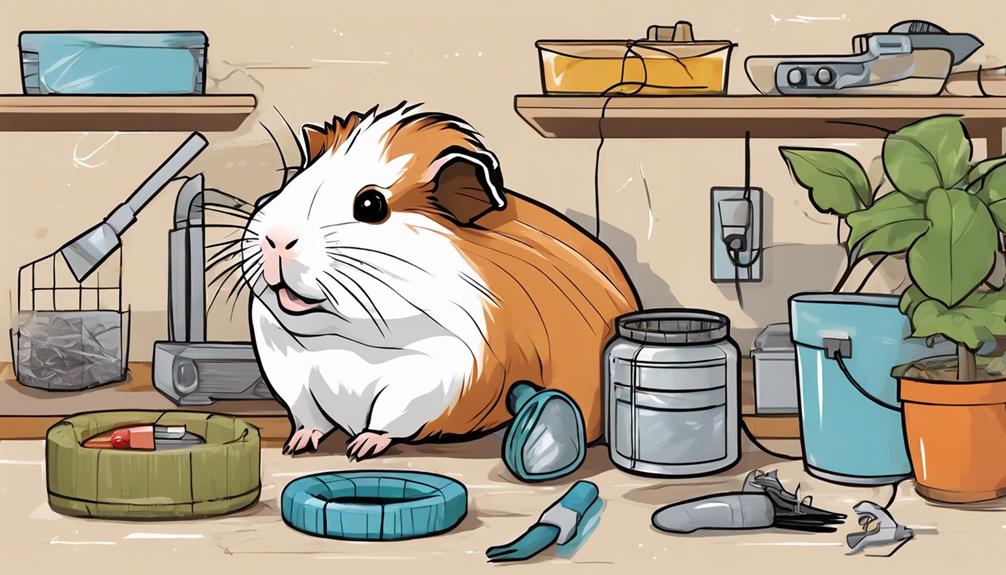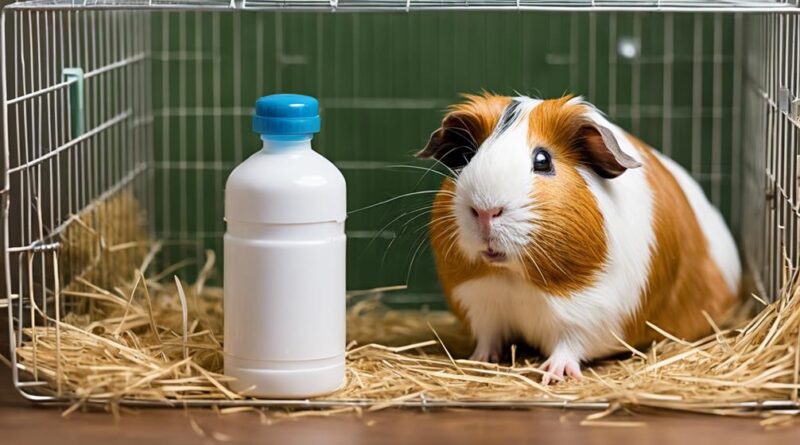Six Tips to Safeguard Your Guinea Pig
To keep your guinea pig safe and healthy, you must understand their behavior, provide safe housing, offer a proper diet, ensure proper handling, and be alert to signs of illness.
But there's one crucial tip that often gets overlooked, a simple adjustment that can make a significant difference in your pet's well-being.
By implementing this often underestimated safeguard, you can greatly enhance your guinea pig's quality of life and prevent potential health issues.
Understanding Guinea Pig Behavior
When observing guinea pig behavior, pay attention to their body language and vocalizations to understand their feelings and needs. Communication cues play a crucial role in deciphering what your guinea pig is trying to convey. For example, if your guinea pig is making short, high-pitched noises, it may be a sign of excitement or anticipation, while a continuous, low-pitched sound could indicate discomfort or fear. Understanding these vocalizations can help you respond appropriately to your pet's emotional state.
In addition to vocal cues, behavioral patterns can also provide valuable insights into your guinea pig's well-being. For instance, if your guinea pig is exhibiting repetitive behaviors like pacing or circling, it might be a sign of stress or boredom. On the other hand, a guinea pig that's relaxed and comfortable in its environment will often engage in playful activities like popcorning or exploring its surroundings with curiosity. By observing these behavioral patterns, you can assess your guinea pig's mood and make adjustments to ensure its physical and mental health.
Safe Housing Options
Choosing the right housing option is crucial for providing a safe and comfortable environment for your guinea pig. When it comes to safe housing options, you have two main choices: outdoor enclosures or indoor cages. Indoor cages are a popular choice as they protect your guinea pig from outdoor elements and predators. Make sure the cage is spacious enough to allow for exercise and exploration.
For indoor cages, bedding options play a vital role in your guinea pig's comfort. Opt for bedding materials like hay, paper-based bedding, or fleece liners. These materials are safe for your guinea pig to burrow in and provide a cozy environment. Regularly clean the bedding to prevent odors and maintain hygiene. A weekly cleaning routine is recommended to keep the cage fresh and free of bacteria.
If you decide to house your guinea pig outdoors, ensure the enclosure is secure to prevent escapes and protect your pet from predators. Outdoor enclosures should have a roof to shield your guinea pig from rain and direct sunlight. Additionally, provide hiding spots and shelters within the enclosure for your guinea pig to feel safe and secure.
Proper Diet and Nutrition
To ensure your guinea pig remains healthy and happy, it's essential to provide them with a well-balanced diet and proper nutrition. Diet essentials for guinea pigs include high-quality hay, fresh vegetables, pellets specifically formulated for guinea pigs, and fresh water. Hay is a crucial part of their diet as it helps maintain healthy digestion and wears down their teeth, which continuously grow. Ensure the hay is clean, dry, and always available.
In addition to hay, fresh vegetables should be a daily part of your guinea pig's diet. Leafy greens like romaine lettuce, spinach, and cilantro are excellent choices. Introduce new vegetables gradually to prevent digestive upsets. Pellets designed for guinea pigs should be fed in limited quantities to ensure a balanced diet. Check the label to ensure they contain Vitamin C, an essential nutrient for guinea pigs.
Maintaining nutritional balance is key to your guinea pig's well-being. Avoid feeding them foods high in sugar, fat, or salt, as these can lead to health problems. Provide a variety of vegetables to ensure they receive all necessary vitamins and minerals. Remember that each guinea pig is unique, so observe their eating habits and adjust their diet as needed to keep them healthy and happy.
Handling and Socialization Guidelines
For proper care of your guinea pig, it's essential to understand handling and socialization guidelines. When it comes to gentle handling, always remember to support your guinea pig's body properly to avoid unnecessary stress or injury. Use positive reinforcement like offering treats when they allow handling to create a positive association. Guinea pigs can be timid, so approach them calmly and speak softly to help them feel safe.
Socialization techniques are crucial for your guinea pig's mental well-being. Spend quality time with your pet daily to build trust and strengthen your bond. Bonding exercises such as hand-feeding or gentle petting can help them become more comfortable around you. Encourage exploration by introducing safe toys and hiding spots in their living area to keep them engaged and active.
It's important to introduce your guinea pig to new experiences gradually. Avoid sudden movements or loud noises, as these can startle them. If you have more than one guinea pig, ensure they've enough space to coexist peacefully and provide separate food and water dishes to prevent competition.
Recognizing Signs of Illness
Recognizing signs of illness in your guinea pig is crucial for maintaining their health and well-being. Common illnesses that guinea pigs may experience include respiratory infections, dental issues, parasites, and scurvy. It's essential to monitor your pet for any changes in behavior or appearance that could indicate a potential health problem.
One common sign of illness in guinea pigs is a change in appetite. If your guinea pig suddenly stops eating or shows a decreased interest in food, it could be a sign of an underlying issue. Additionally, watch out for any changes in water consumption, as increased or decreased intake may also signal a problem.
Other symptoms to look out for include lethargy, weight loss, difficulty breathing, sneezing, discharge from the eyes or nose, overgrown teeth, rough or puffed-up fur, and skin issues. If you notice any of these signs, it's crucial to consult a veterinarian who specializes in small animals.
When it comes to treatment options, the veterinarian may recommend medications, dietary changes, or environmental adjustments to help your guinea pig recover. Prompt diagnosis and treatment are essential for a successful recovery, so don't hesitate to seek professional help if you suspect your guinea pig is unwell.
Creating a Safe Play Area
When setting up a safe play area for your guinea pig, consider key factors to ensure their well-being and enjoyment. Playpen options are essential for creating a secure environment for your pet to roam freely. Look for playpens made specifically for small animals like guinea pigs, ensuring that the bars are close enough together to prevent escape but with enough space for exploration. Consider a playpen with a top cover to prevent your guinea pig from jumping out.
Supervision tips are crucial to keep your guinea pig safe during playtime. Always supervise your pet while they're in the play area to ensure they don't get into any mischief or potentially harmful situations. Check for any small spaces where your guinea pig could get stuck or items they could chew on and remove them promptly. Additionally, make sure there are no other pets or young children around that could accidentally harm your guinea pig.
Hazardous Household Items

Check your home for any potential hazardous items that could harm your guinea pig. Be cautious of toxic plants and hidden dangers that may pose a risk to your furry friend. Some common household items can be harmful to guinea pigs, so it's essential to create a safe environment for them.
Toxic plants are a significant concern when it comes to guinea pig safety. Certain plants like lilies, ivy, and daffodils are toxic to guinea pigs if ingested. Make sure to keep these plants out of reach or avoid having them in your home altogether. Opt for guinea pig-friendly plants such as spider plants or herbs like parsley and cilantro.
Hidden dangers lurk in unexpected places around your home. Electrical cords, small objects, and sharp items can all be hazardous to your guinea pig. Keep cords secured and out of reach, pick up any small objects that could be swallowed, and ensure there are no sharp edges or corners that your pet could injure themselves on.
Emergency Preparedness
Be prepared for any potential emergencies by ensuring you have a designated evacuation plan in place for your guinea pig's safety. In case of an emergency, swift action can make a significant difference in your guinea pig's well-being. Here are some crucial steps to include in your emergency preparedness plan:
- First Aid Kit: Assemble a first aid kit specifically tailored for your guinea pig. Include items such as sterile gauze, saline solution, styptic powder for nail trimming accidents, a small pet-safe thermometer, and any medications your guinea pig may need.
- Evacuation Supplies: Prepare a portable evacuation kit that includes your guinea pig's essentials. This kit should contain a travel carrier, extra bedding, food and water for at least three days, a familiar toy or blanket for comfort, and any medical records or identification tags.
- Emergency Contact List: Create a list of emergency contacts, including your veterinarian's contact information, nearby animal shelters or emergency clinics, and a trusted friend or family member who can assist in case you're unable to care for your guinea pig during an emergency.
Frequently Asked Questions
Can Guinea Pigs Be Trained to Do Tricks or Respond to Commands?
Yes, guinea pigs can be trained to do simple tricks and respond to basic commands. Training techniques involve positive reinforcement with treats and repetition. However, due to their nature, guinea pigs have limitations in learning complex tricks or commands.
Teaching them to come when called or to navigate simple obstacles are common tricks that can be successfully taught with patience and consistency.
How Can I Help My Guinea Pig Adjust to a New Environment or Cage Mate?
When helping your guinea pig adjust to a new environment or cage mate, start by using bonding techniques and socialization methods. Introduce them gradually and monitor their interactions.
Provide enclosure enrichment like tunnels and hiding spots to reduce stress. Adjust their diet slowly to prevent digestive issues.
Is It Safe for Guinea Pigs to Be Around Other Pets Like Dogs or Cats?
When considering pet compatibility, it's crucial to supervise interactions between guinea pigs and other animals like cats or dogs. Even if your pets seem friendly, keep a close eye on them to ensure everyone stays safe.
Guinea pigs are small and delicate, so it's best to introduce them slowly and under supervision to prevent any accidents. Always prioritize the well-being of your furry friends during these interactions.
What Are Some Common Behavioral Problems in Guinea Pigs and How Can They Be Addressed?
When guinea pigs face behavioral issues, it's often due to socialization difficulties or handling stressors. To address these problems, try introducing socialization techniques like supervised playtime with other guinea pigs to boost their interaction skills. Additionally, create a calm environment by minimizing loud noises and sudden movements that can stress them out.
How Often Should I Take My Guinea Pig to the Vet for Check-Ups and Vaccinations?
You should take your guinea pig to the vet for routine check-ups at least once a year. During these visits, your vet can assess your pet's overall health and catch any potential issues early.
Vaccination schedules for guinea pigs may vary based on where you live and your vet's recommendations, so it's important to discuss this with your vet to ensure your furry friend stays healthy and happy.
Conclusion
By following these tips, you can ensure the safety and well-being of your guinea pig. Understanding their behavior, providing a safe environment, proper nutrition, and socialization are key.
Keep an eye out for signs of illness and create a safe play area for your furry friend. Remember to be prepared for emergencies and eliminate any hazardous household items.
Your guinea pig will thank you for taking good care of them!
